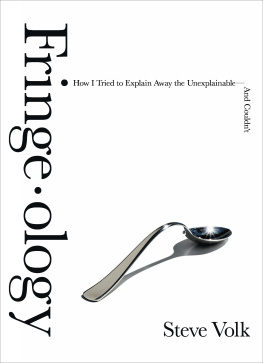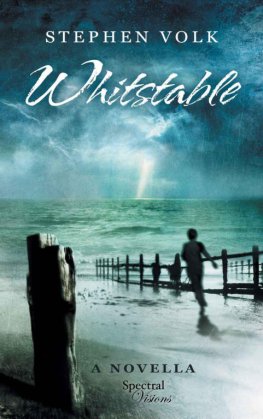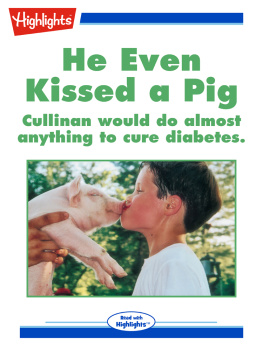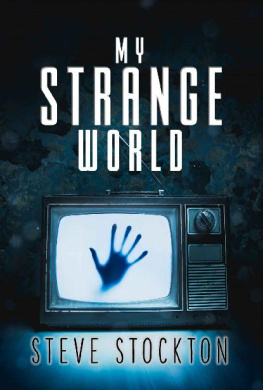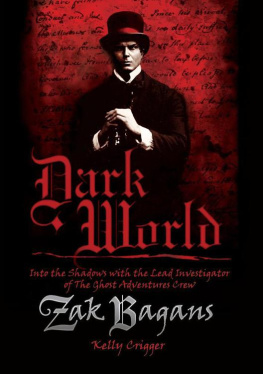Introduction
What We Talk About When We Talk About the Paranormal
Or: Why we cant even agree on just what it is were discussing
My point is not that religion itself is the motivation for wars, murders and terrorist attacks, but that religion is the principal label, and the most dangerous one, by which a they as opposed to a we can be identified at all.
Richard Dawkins, Time to Stand Up
Its cramped and irrational to say that there is no Godand premature. Because we are pathetically ignorant of the universe.
Martin Amis
People, I just want to say, you know, can we all get along?
Rodney King
We have been sitting in the dark for hours. I am on the outside of a circle of a half-dozen strangers, reclining on the thick carpeting of a suburban home, watching the silhouette of a hulking man with a digital audio recorder. We are waiting, and listening, for some proof of a ghostly presence in the room. And I, for one, am not optimistic. Ive come here with Lou Gentile, a well-known figure within the murky realms of ghost hunting. And so far, we have found nothing to confirm what this family in central New Jersey has told us: they tell us about strange rappings, jiggling doorknobs, and an occasional bang in the basement. We have heard nothing of the kind. But more than that, we both think the vibe this family gives off is strange enough without the additive of spirits.
The family patriarch, who Ill refer to here as Paul, moves with the disassociated air of a ghost himself. He is a quiet, intense divorc who seems to rule over his girlfriend and son with his ominous silences. Like me, he has recently lost a parentin this case, his father. And while his family seems to maintain an appropriate skepticism, he clearly wants to believe.
Earlier, he showed Gentile a series of odd photos, including one that displayed what appeared to be a large, jagged light in his bedroom. He seemed happy when Gentile told him he wasnt sure what kind of camera defect might produce that anomaly. It could be a defect, Gentile told him, but I havent seen one quite like this.
Paul also showed us a video he made in the basement, which was about as interesting, aesthetically, as might be expected. The static image he captured was mostly darkness, with the outline of a weight bench in the middle ground and still more darkness fanning out behind it. Every few seconds, however, a ping echoed in the room. The sound is probably distorted by the condenser microphone on your camera, Gentile told him. But its worth investigating.
Gentile sent me down to the basement at that point, to sit in the dark. And though I was suitably scared for a minute or so, it quickly became clear to me that the mysterious noises Paul drew our attention to were produced by nothing more spectral than the air conditioning ducts that cut back and forth across the ceiling. I reported my findings to Gentile, who expected as much. It doesnt mean nothing is happening here, he told Paul. But the sounds on the video are just produced by your air conditioning unit.
Paul, sitting cross-legged on the floor, looked distraught. Gentile readied his little digital recorder and asked Paul to turn off all the lights in the house. Hours passed. Gentile asked questions into the darkness, then played back the audio, listening for ghostly responses. Believers call this electronic voice phenomenon. I considered it a kind of investigative dead end, a series of unintelligible, scratchy noises that could easily have been produced by the recorder itselfthe sounds occasionally coalescing by chance into a snatch that could be mistaken for a word or maybe even a phrase. On this night, Gentile didnt seem particularly impressed by the results either. So to shake things up, he invited everyone in the circle to take turns asking questions. When it was Pauls turn, he knelt down in front of the recorder and asked the only question of the dark that could be expected from a grieving son: Are you my father?
Gentiles recorder captured no response.
F OR MANY PEOPLE, AND especially hard-core skeptics, all the paranormal ever amounts to is the wishful thinking of the grieving. By this time, however, I already knew better. I had been out with Gentile on more than a half-dozen investigations, and while much of what we saw and heard could be easily tracked to some earthly origin, some couldnt. Further, while some of the self-proclaimed witnesses seemed to like the idea of ghosts in their houses, others were hoping Gentile might find some prosaic explanation. This in and of itself should not come as much of a surprise. If all our strange experiences could be explained so easily as a simple mishmash of wishful thinking and creaking floorboards, wed have no need of the word paranormal . But we do. Paranormal experiences have been with us since the beginning of recorded history. And they dont seem inclined to go away any time soon.
In fact, just on the subject of spirits, researcher and folklorist Lionel Fanthorpe announced in 2010 that ghost sightings were at their highest point in twenty-five years. We continue to be inundated with tales of unidentified flying objects (UFOs), and some of the accounts could fuel a feature film: Winston Churchill supposedly quashed a dramatic UFO report, fearing a public panic; famous U.K. computer hacker Gary McKinnon went poking around in NASAs mainframe for evidence of alien spacecraft, evidence that he claims he found; but alas, he had no time to download the telltale photograph before his connection was cut off by an angry American government.
But the question we need to ask going forward is, What exactly are we talking about when we talk about the paranormal? I could, in fact, fill endless pages with odd, tantalizing stories. Did you hear the one about the cab drivers on the Solomon Islands? In the fall of 2008 they started complaining about picking up passengers who acted completely normal until they disappeared suddenly from the backseat. And they never did pay their fares. In the coming pages, I write about near-death experiences (NDEs), mental telepathy, quantum consciousness, UFOs, a mystic astronaut, ghost hunting, and a pair of scientists doing their level best to study aspects of human experience often derided as paranormal. But this book is about more than any of these things. This is a book about us.
We live in a world of false certainties: Whether we are discussing politics, religion, or economics, when we flip on our televisions or open our Web browsers to a news site, we encounter the often strongly held opinions of othersopinions that lead us into a series of binary choices: conservative or liberal, believer or atheist, capitalist or socialist. My argument, simply, is that these are false choicesthat there are middle paths that bear more fruit. But unfortunately, as well see in the pages of this book, it is human nature and an automatic function of the brain to frame conflicting worldviews in extreme terms of right and wrong, good and evil, rational and irrational. And I would argue that this kind of Us Versus Them thinking is perhaps best and most readily seen in debates about the paranormal.
The word paranormal is itself a kind of victim of human psychology, too often conflated with supernatural : of or relating to an order of existence beyond the visible observable universe; especially: of or relating to God or a god, demigod, spirit, or devil. Paranormal , conversely, can be and often is defined in far broader and more scientifically useful terms: of or pertaining to events or perceptions occurring without scientific explanation. In fact, Websters Third New International Dictionary defines paranormal as beyond the range of scientifically known or recognizable phenomena. If we take these definitions, the supernatural seems to force us toward religion, while the paranormal merely forces us to say, I dont know. There should be no shame in that, but I think the faithful too often want to equate their beliefs with knowledge, while the skeptics fear that admitting a lack of a final answer opens the door to all manner of hoo ha, including God. The skeptics also tend to view the words supernatural and paranormal as if they are easily interchangeable, but whereas the supernatural seems to lie firmly beyond science, the paranormal waits patiently for the technology and the willing scientists necessary for its discovery .

